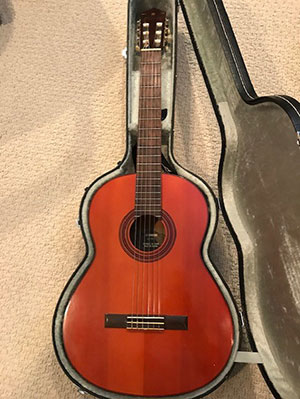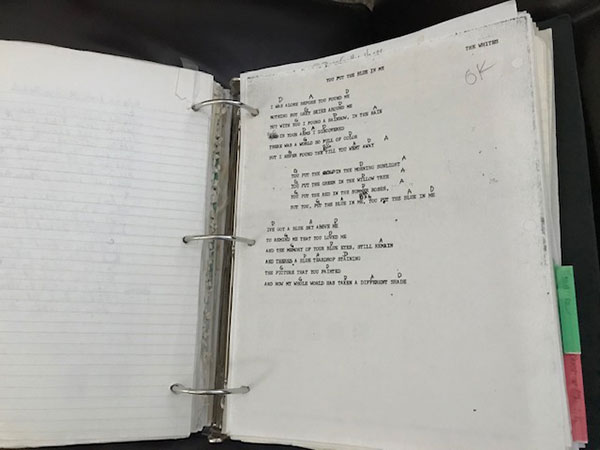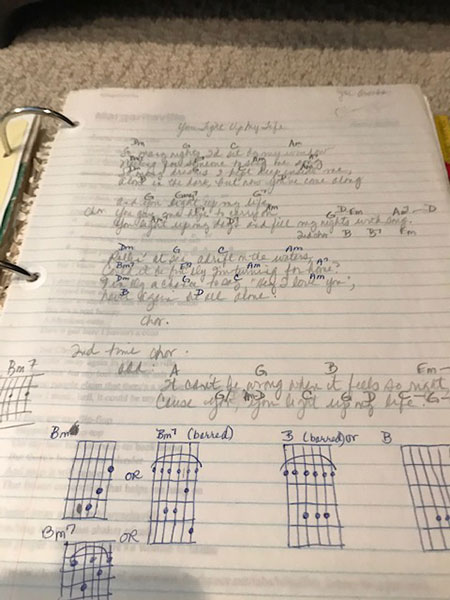“Fantasy and feeling lie deeper than words…
and both demand a more profound, more biological expression,
the primitive expression of music.”
(Maurice Sendak in “The Shape of Music”)
Tied up in knots — nots — er — words? Are sentences slithering past you and paragraphs parachuting from your brain? If so, maybe it’s time to step away from the writing task, or any chore that has you flummoxed, and give yourself a break, isn’t it? But — what to do? Take a walk? Bake cookies? Call a friend?
 When my writing work becomes mired in self-doubt (oh, yes, that happens!) or just the precise word choice continues to take flight and vanish, it’s time to pick up a guitar and my “fake book,” (a loose-leaf binder that contains not much sheet music, but plenty of song sheets with just chords and lyrics) and lose myself and my word-worries in music. (Well, we could call it music; please remember, you haven’t heard me play 😊.) Settling in to play an old favorite song is like meeting with a dear, familiar friend for a special conversation. Of course, being a little rusty is always a challenge, but perseverance and persistence will win out, and the old muscle memory will eventually kick in. Trying out a brand-new song is a chance to learn and experiment with chord changes and fumble around with picking patterns. Even though playing music can often be a challenge, it’s a different sort of challenge from what just tied us up in knots, so, it’s a great way to refresh and re-order our thoughts, no matter what kind of an instrument we play. It’s like taking a vacation without having to book a flight and undergo all the hassle of travel.
When my writing work becomes mired in self-doubt (oh, yes, that happens!) or just the precise word choice continues to take flight and vanish, it’s time to pick up a guitar and my “fake book,” (a loose-leaf binder that contains not much sheet music, but plenty of song sheets with just chords and lyrics) and lose myself and my word-worries in music. (Well, we could call it music; please remember, you haven’t heard me play 😊.) Settling in to play an old favorite song is like meeting with a dear, familiar friend for a special conversation. Of course, being a little rusty is always a challenge, but perseverance and persistence will win out, and the old muscle memory will eventually kick in. Trying out a brand-new song is a chance to learn and experiment with chord changes and fumble around with picking patterns. Even though playing music can often be a challenge, it’s a different sort of challenge from what just tied us up in knots, so, it’s a great way to refresh and re-order our thoughts, no matter what kind of an instrument we play. It’s like taking a vacation without having to book a flight and undergo all the hassle of travel.

We all know about the scientific research that documents the benefits of playing an instrument — it makes our brains active in a totally different way — staves off dementia — and fires up neural connections that aren’t often used. It’s a mystery how it actually works, but what happens is that concentrating on plucking or strumming the right strings and trying (underline “trying”) to play the chords correctly manages to evaporate all my writing quandaries and troubles.

Losing ourselves in playing an instrument is a refreshing way to take a break from any kind of box we may have put ourselves in. Focusing on melodies and sounds somehow frees our minds to transcend the here and now and carries us into another dimension. In our supercharged, hyperactive, and digitalized culture, it may seem wasteful, unproductive, and even ridiculous to spend time playing music when we’ll probably never play on stage or perform in front of anyone. (Do we have friends that are that patient and understanding with us?) The rewards of playing music are many and surprising, however, because new insights are discovered, and viable solutions appear where there were only frustrating dead-ends, before. Our problem-solving time spent on the instrument has given us flexibility to solve our “real-world” conundrums in a new way.
We’re never too old or too busy (we can take a risk and put aside that never-ending “to-do” list!) to pick up an instrument — either one we’ve played before and have neglected for years — or a new one — for a musical breakthrough adventure. They say that music soothes the savage beast; for me, it soothes my frazzled brain. So, the next time you are tied up in knots, or nots, dust off that old flute or clarinet, or tune up the keyboard or guitar, play your troubles away, and soon you’ll be singing a new tune!
